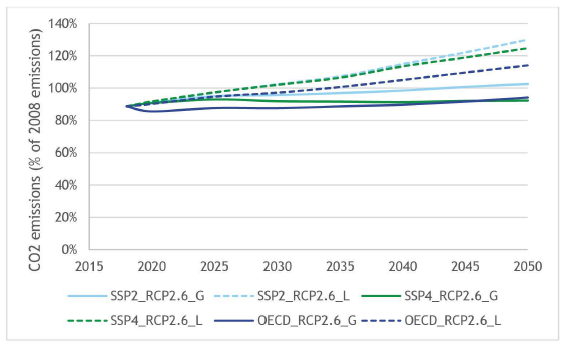
The International Maritime Organization (IMO) recently published its Fourth IMO GHG Study 2020 which examines data collected in 2018. The previous IMO GHG Study 2014 looked at 2012 data. The latest study found that GHG emissions of total shipping (international, domestic, and fishing) increased +9.6% from 977Mt in 2012 to 1,076Mt in 2018.
This is the first IMO GHG Study able to distinguish between domestic shipping and international emissions on a voyage basis and thus provides a more accurate picture of GHG inventories.
Using the Third IMO GHG Study’s vessel-based allocation of international shipping emission, CO2 emissions have increased +8.4% from 848Mt in 2012 to 919Mt in 2018. Under the new voyage-based allocation, the 2020 study found CO2 emissions have also increased +5.6% from 701Mt in 2012 to 740Mt in 2018.
The Fourth IMO GHG Study 2020 also estimates for the first-time carbon intensity. It found that while carbon intensity in international shipping improved by around 20-30% between 2012-2018, more than half of the improvement was achieved before 2012 and the pace of reduction has slowed since 2015.
The study’s 2018-2050 emission projections see emissions increase from about 90% of 2008 emissions in 2018 to 90-130% of 2008 emissions by 2050.

Figure 1 – Projections of maritime ship emissions as a percentage of 2008 emissions
Preliminary assessment of the Covid-19 impact on emission projections found that although emissions in 2020 and 2021 will be significantly lower, the pandemic’s impact on projections over the next decades leading up to 2050 will likely be smaller than the uncertainty range of presented scenarios.
Mr Kitack Lim, Secretary-General of the IMO said in the foreword that under all projected scenarios, a large share of the total amount of CO2 reduction is expected to come from the use of low and zero-carbon fuels as it will be difficult to achieve IMO’s 2050 GHG reduction ambition through only energy-saving technologies and speed reduction of ships.
For more information click here:
https://www.imo.org/en/OurWork/Environment/Pages/Fourth-IMO-Greenhouse-Gas-Study-2020.aspx
